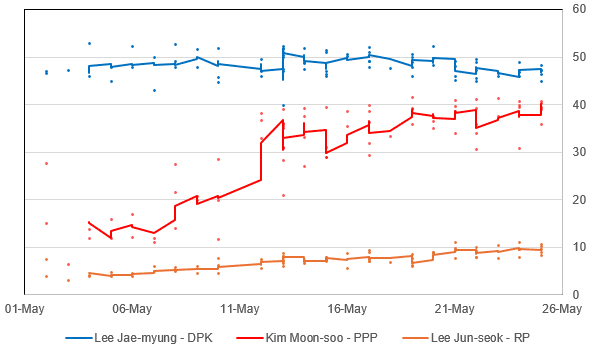SOUTH KOREA: Lee's Lead Narrows, But Still Strong Favourite For 3 June Election
Lee Jae-myung remains the strong favourite to win the presidency in the upcoming 3 June election. Opinion polling shows Lee, the candidate for the main opposition liberal Democratic Party of Korea (DPK), averaging support of 47.7% over the week ending 25 May, compared to 38.0% for Kim Moon-soo from the conservative People Power Party (PPP). While this represents a narrowing from the 49.0%-33.8% recorded in the week ending 18 May, it is not enough for political betting markets to perceive a notable shift in the race. Data from Polymarket gives Lee a 92.1% implied probability of winning the contest according to bettors.
- The country's electorate remains deeply divided following former President Yoon Suk-yeol's brief imposition of martial law in Dec 2024, and his subsequent impeachment with mass protests continuing for months both in support and opposition to Yoon. Lee was defeated by Yoon in the 2023 presidential election and, if victorious, faces the difficult task of bringing together a polarised population - many of whom deeply oppose the DPK leader - as well as repairing South Korea's democratic image on the international stage.
- While Kim has boosted his standing in recent weeks his inability to convince Lee Jun-seok, another conservative running for the Reform Party, to withdraw from the contest looks set to split the centre-right/right-wing vote and deny the PPP the chance of retaining the presidency.
Chart 1. Presidential Election Opinion Polling, % and 4-Poll Moving Average

Source: Realmeter, KIR, WinG Korea, Embrain Public, Gallup Korea, Research&Research, Flower Research, Korea Research, Ace Research, KOPRA, Ipsos, Hankook Research, Researchview, Gongjung, Jowon C&I, Hangil Research, MNI
Want to read more?
Find more articles and bullets on these widgets:
Historical bullets
US TSYS: Extraordinary Measures And Cash Look Sufficient To Head Off X-Date
Treasury has about $164B in "extraordinary measures" available as of April 23 to avoid hitting the debt limit, per its regular report out Friday. That's out of a maximum total of $375B (they have used $211B).
- With Treasury cash looking healthy (around $600B), that's a fair amount of dry powder to get through the summer months to wait out the debt limit impasse. Tax receipts have looked strong with tariff revenues also starting to boost cash flows, further reducing the near-term urgency to adjust bond issuance.
- This has also helped push back analyst “x-date” expectations to later in the summer/September. We expect to hear from Treasury about its own x-date assumptions next week.

US TSYS: Treasury Market Trading Stayed Orderly In April: Fed Report
Liquidity across financial markets including the Treasury market deteriorated after President Trump's April 2 reciprocal tariffs announcement but market functioning was generally orderly, according to the Federal Reserve's semiannual report on financial stability, released Friday. (PDF link is here)
- Treasury market liquidity has been poor for years and yields were particularly volatile in early April, contributing to a deterioration in market liquidity, the Fed said.
- Nevertheless "trading remained orderly, and markets continued to function without serious disruption," according to the report, which looked at information available as of April 11.
FED: Ex-Gov Warsh: Fed Has Failed To Satisfy Price Stability Remit
From our Washington Policy Team - Some fairly sharp words today from ex-Fed Governor Warsh on the central bank (who for what it's worth is seen by betting markets as by far the frontrunner for the next Fed Chair):
- The best way for the Federal Reserve to safeguard its independence is for policymakers to avoid expanding the institution's role over time, including wading into policy areas that are outside its core mission, former Fed Governor Kevin Warsh, a leading contender to replace Jerome Powell as chair next year, said Friday.
- "I strongly believe in the operational independence of monetary policy as a wise political economy decision. And I believe that Fed independence is chiefly up to the Fed," Warsh said in a speech at a Group of Thirty event on the sidelines of the IMF meetings. "Institutional drift has coincided with the Fed’s failure to satisfy an essential part of its statutory remit, price stability. It has also contributed to an explosion of federal spending." His speech made no mention of Trump's tariffs or the appropriate monetary policy to deal with them.
- He said the ideas of data dependence and forward guidance widely adopted by Fed officials are not especially useful and might even be counterproductive.
"We should care little about two numbers to the right of the decimal point in the latest government release. Breathlessly awaiting trailing data from stale national accounts -- subject to significant, subsequent revision -- is evidence of false precision and analytic complacency," he said.
"Near-term forecasting is another distracting Fed preoccupation. Economists are not immune to the frailties of human nature. Once policymakers reveal their economic forecast, they can become prisoners of their own words. Fed leaders would be well-served to skip opportunities to share their latest musings."